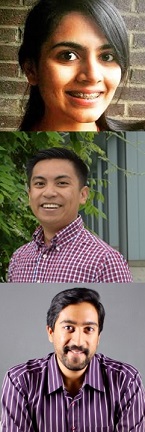
The Three Minute Thesis (3MT®) Competition, developed by The University of Queensland, helps higher degree students hone their research communication skills by challenging them to effectively explain their research in three minutes to a non-specialist audience. The University of Pittsburgh Swanson School of Engineering held an inaugural school-wide pre-qualifying event where the Department of Bioengineering swept all three awards.
Piyusha Gade (pictured top), a graduate student researcher in the lab of McGowan Institute for Regenerative Medicine affiliated faculty member Anne Robertson, PhD, Professor of Mechanical Engineering and Materials Science, captured first place in both the pre-qualifying event and the university-wide event. Her work involves rationally designing in situ engineered vascular grafts in young and aged hosts.
“I think effective science communication is extremely vital,” said Ms. Gade. “Especially today, it is not enough to just do good scientific work; you also need to communicate its relevance and impact to really make a change. Being a part of this competition helped me to take a step back and look at the big picture to understand where my work fits into it. I loved trying to figure out how to boil down five years-worth of research into three minutes!”
As the first-place winner, Ms. Gade will go on to compete in the 2019 Trans-Tasman 3MT Competition.
Gerald Ferrer (pictured center), a graduate student in the Orthopaedic Robotics Lab helmed by Bioengineering Professor and McGowan Institute affiliated faculty member Richard Debski, PhD, tied for second place in the pre-qualifying event with Aneesh Ramaswamy (pictured bottom), a graduate student in the Vascular Bioengineering Lab of McGowan Institute affiliated faculty member David Vorp, PhD, Associate Dean for Research and John A. Swanson Professor of Bioengineering.
Mr. Ferrer went on to win two prizes in the university-wide event: the runner-up prize and the People’s Choice award. His current research is focused on quantifying location specific mechanical properties in tendons using different ultrasound techniques and understanding key biomechanical factors that influence rotator cuff tear propagation through computational models.
“I enjoyed the challenge of communicating the significance and impact of our research in a way that everyone – regardless of their background – could understand and relate to, all in under three minutes,” Mr. Ferrer said. “Being able to communicate with a diverse audience is important because it allows us to bridge the gap between scientists and nonscientists thus increasing awareness of the societal impact of your research.”
3MT is designed to encourage students to communicate the importance of their research to the broader community. Since its launch in 2008, the 3MT competition has expanded to 67 countries, and events are currently held at more than 600 universities worldwide.
“The Three Minute Thesis competition provided an excellent opportunity for our graduate students to reflect on their work and strengthen their ability to clearly and effectively communicate their research,” said Mary Besterfield-Sacre, Nickolas A. Dececco Professor of Industrial Engineering and Associate Dean for Academic Affairs. “These professional development activities help inspire our students to pursue academic excellence, and I look forward to holding this event again next year.”
Congratulations, all!
Illustration: Gade (Research Gate); Ferrer (Debski Lab); Ramaswamy (sciVelo).
Read more…
University of Pittsburgh Swanson School of Engineering News Release 1
University of Pittsburgh Swanson School of Engineering News Release 2
